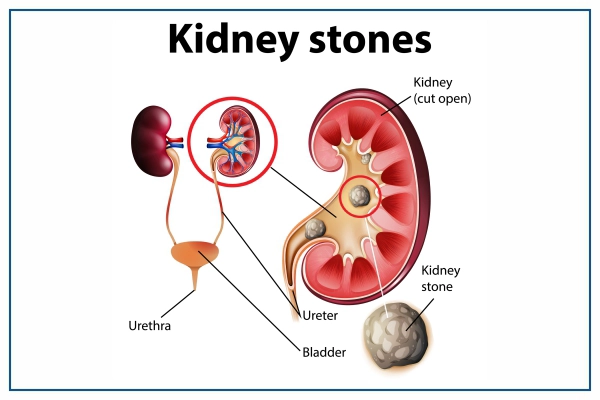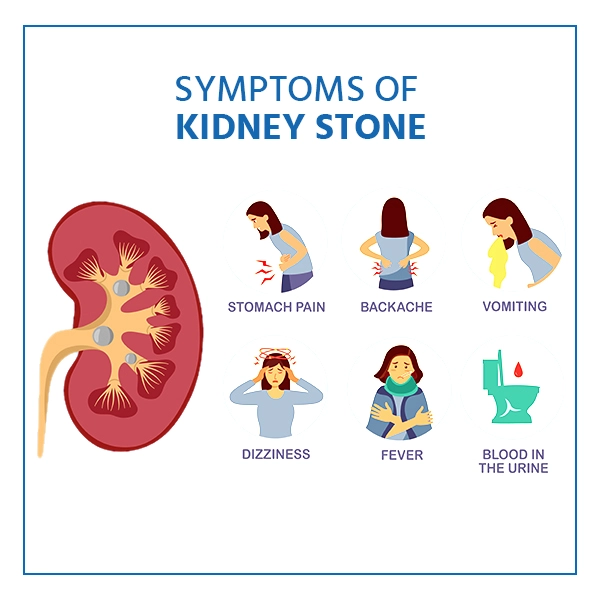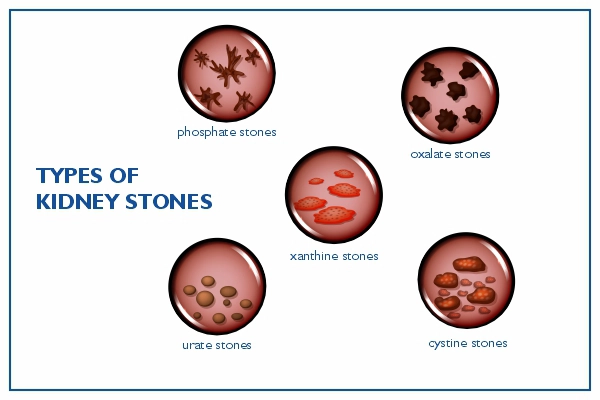What is a Kidney Stone?
Kidney stones (renal calculi, urolithiasis, or nephrolithiasis) are hard masses, deposits of minerals and salts that form inside the kidneys.
Kidney stones are usually the size of a chickpea, but they can also be as small as a grain of sand or as large as a golf ball. Small stones can pass through the urinary tract, but larger ones may require surgery.
Various factors, including diet, excess body weight, certain medical conditions, and certain supplements and medications, can cause kidney stones. They can affect any part of the urinary tract, including the kidneys and bladder.

Secure your health with a second opinion. Make informed decisions and book your appointment today!
Get A Second OpinionSymptoms of Kidney Stone:
A kidney stone usually doesn't cause problems until it starts moving around inside the kidney or moves through the tubes connecting the kidney and bladder. It might stop urine flow, make the kidney bigger, and lead to painful spasms in the tube connecting the kidney and bladder.
You may then experience the following signs and symptoms:
- Pain in the side and back, below the ribcage, is severe and intense
- Pain in the lower abdomen and groin that radiates
- Urinating causes pain or a burning sensation.
- Blood in the urine
- Frequent urge to urinate
- Urinating in small amounts
- Nausea
- Fever and chills
As a kidney stone passes through the urinary tract, the pain it causes may vary—for example, it may migrate to a new spot or rise in intensity.

Types of Kidney Stones
Understanding the type of kidney stone can inform its cause and guide preventive measures. If possible, save the kidney stone and bring it to the doctor for analysis.
Calcium Stones :
- The majority of kidney stones are calcium stones, primarily calcium oxalate.
- Oxalate is produced by the liver or consumed through diet and is found in fruits, vegetables, nuts, and chocolate.
Struvite Stones :
- Develop due to urinary tract infections.
- It can grow rapidly and become large with minimal warning signs.

Uric Acid Stones
- Associated with high-protein diets, diabetes, metabolic syndrome, chronic diarrhea, or malabsorption.
- Genetic factors may increase risk.
Cystine Stones
- Formed in individuals with cystinuria, a hereditary condition.
- Kidneys excrete excessive amounts of specific amino acids.
What are the causes of Kidney Stones?
Dehydration
- Inadequate fluid intake leads to concentrated urine, promoting mineral crystallisation.
Dietary Factors
- High intake of sodium, oxalate, and animal proteins, combined with low calcium and fluid intake, increases stone risk by promoting mineral buildup in urine.
Family History
- People with a family history of kidney stones are more likely to develop them, suggesting either a genetic predisposition or shared environmental factors that contribute to stone formation.
Medical Conditions
- Conditions like urinary tract infections, cystic kidney diseases, hyperparathyroidism, and inflammatory bowel diseases can alter urine composition or kidney function, predisposing individuals to kidney stones.
Obesity
- Metabolic changes associated with excess weight increase urinary excretion of calcium, uric acid, and other substances contributing to kidney stone formation.
Risk factors of Kidney Stones
The following factors enhance the chance of getting kidney stones:
Dehydration
- Inadequate water intake raises the risk of kidney stones.
- People in hot, dry areas or those prone to heavy sweating are at higher risk.
Obesity
- High BMI, large waist circumference, and weight gain increase the risk of kidney stones.
Digestive Diseases and Surgery
- Inflammatory bowel disease or gastric bypass surgery can disrupt calcium and water absorption.
- This disruption may elevate the concentration of stone-forming chemicals in urine, leading to a higher risk of kidney stones.
Diagnosis of Kidney Stones
Blood Testing
- Detects excess calcium or uric acid in the blood.
- Helps monitor kidney health and identify potential medical concerns.
Urine Testing
- 24-hour urine collection may reveal abnormal levels of stone-forming minerals or chemicals.
- The doctor may recommend multiple urine samples over consecutive days.
Imaging
- Various imaging tests, including high-speed or dual-energy computerized tomography (CT) and ultrasound, can detect kidney stones.
- Even microscopic stones can be identified.
- Abdominal X-rays are less commonly used.
Treatment Options for Kidney Stones
Small Stones with Minimal Symptoms:
Drinking Water
- Adequate hydration (1.8 to 3.6 litres/day) helps dilute urine and prevent stone formation.
Surgery Options for Large Stones
Percutaneous Nephrolithotomy
- Surgery to remove large kidney stones using a small telescope inserted through a small incision in the back.
- Requires anesthesia and hospitalization for recovery.
Ureteroscopy
- Insertion of a thin tube with a camera through the urethra and bladder into the ureter to remove or break up small stones.
- It may require general or local anesthesia.
Prevention of Kidney Stones
Stay Hydrated:
- Maintain adequate urine volume by drinking plenty of water throughout the day.
Balanced Diet:
- Consume a diet rich in fruits, vegetables, and whole grains while limiting sodium, animal proteins, and oxalate-rich foods.
Monitor Calcium Intake:
- Ensure appropriate calcium intake from dietary sources to prevent calcium oxalate stone formation.
Limit Oxalate-Rich Foods:
- To lower the risk of stone formation, reduce the intake of oxalate-rich foods such as spinach, nuts, and chocolate.
Maintain Healthy Weight:
- Keep a healthy weight through proper diet and physical activity. This helps lower the chance of getting kidney stones.
Ready to take control of your health journey? Book your appointment now and start your path towards wellness today!
Book an AppointmentFrequently Asked Questions
Yes, kidney stones can often be prevented through lifestyle and dietary changes.
Not all kidney stones cause pain, but kidney stones can be painful if they cause obstruction or irritation in the urinary tract.
Passing a kidney stone's time varies based on size, location, and health. Small stones pass in days to weeks, larger ones may need medical help, and some require surgery.
Kidney stones form when certain substances in urine, such as calcium, oxalate, and uric acid, become highly concentrated and crystallize, gradually forming solid masses. These crystals can then grow larger over time and may eventually become kidney stones.
Kidney stones are typically not dangerous but can cause pain and discomfort. However, if they lead to complications like urinary tract blockage or infections, medical attention may be needed.
Kidney crystals, or stones develop when minerals and salts in the urine become highly concentrated, usually due to dehydration, diet, specific health issues, and genetic factors. Staying hydrated and eating a healthy diet can lower the risk of their formation.
There are different ways to get rid of kidney crystals or stones, depending on their size and where they are located. If the stones are small, they can often pass naturally by drinking more fluids and managing the pain. However, if the stones are larger, medical intervention might be necessary.
